|
Music Reviews
Alternative
Blues
Books
Christmas
Classic Rock
Country
Jazz
Lounge
Oldies
Power Pop
Punk & New Wave
Reggae
Rhythm & Blues
Seventies
Texas
Special Features
Randy's Rodeo
Sex Pistols
Motown
Halloween
Valentine's Day
Information
About Me
Feedback
Links
User's Guide
Support Me
Amazon
iTunes
Sheet Music Plus
|
Sock it to me, Santa! Visit my other website, www.hipchristmas.com Visit my other website, www.hipchristmas.com
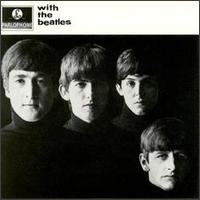 Well,
I almost feel a silly reviewing the
Beatles. Simply, if you don't know by now, me telling you won't help. The Beatles
are simply the greatest rock band that ever existed, and most likely, they
always will be. While pioneers like Jerry Lee Lewis and Fats Domino sadly and
undeservedly fade into obscurity, every generation rediscovers the Beatles.
Their story has been told, retold, and twisted into legend, and I can't set
the record straight on my little web page. I will leave the substantial discussion
of the Beatles history and music to others; with literally hundreds
of books devoted the subject, the discussion is already more than substantial.
But, as a collector, I feel confident declaring that you should own a whole
bunch of Beatles CD's, so instead I'll address which ones and why. Well,
I almost feel a silly reviewing the
Beatles. Simply, if you don't know by now, me telling you won't help. The Beatles
are simply the greatest rock band that ever existed, and most likely, they
always will be. While pioneers like Jerry Lee Lewis and Fats Domino sadly and
undeservedly fade into obscurity, every generation rediscovers the Beatles.
Their story has been told, retold, and twisted into legend, and I can't set
the record straight on my little web page. I will leave the substantial discussion
of the Beatles history and music to others; with literally hundreds
of books devoted the subject, the discussion is already more than substantial.
But, as a collector, I feel confident declaring that you should own a whole
bunch of Beatles CD's, so instead I'll address which ones and why.
In one sense, it's a simple question with an easy answer: buy them all. The
Beatles's original albums are essential listening, and even the slightest of
them yield great rewards. The ones you should definitely own - the ones that
most succinctly encompass their complete, official studio recordings - are
listed below in chronological order. My personal favorite - if forced to choose
- would be Abbey
Road. A masterpiece on every level - songwriting, performance, and production
- it's better all by its lonesome than 99% of every "greatest hits" album
released by anyone (except the Beatles), anywhere, anytime.
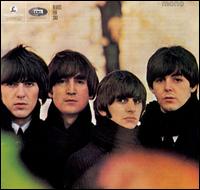 A
common question among consumers, though, concerns why certain Beatle albums (Beatles
'65, Yesterday... And Today, et al.) are not on CD.
The answer? Sit back, it's a long one: the Beatles began releasing records on EMI's
Parlophone label in England in 1962, but their American debut occurred two years later.
When Capitol, the American arm of EMI, began releasing Beatle albums in the U.S., they
culled tracks from a variety of sources, creating new albums often only roughly analogous
to their British counterparts. The American LP Meet The Beatles,
for instance, is similar to the British album With
The Beatles, but other American albums (e.g. Hey Jude)
were thrown together from leftover tracks and never had a British doppelganger.
Years later, when Capitol began reissuing the Beatles' catalog on CD, they released
the albums in their original British format - which, as we will see, is a good thing. A
common question among consumers, though, concerns why certain Beatle albums (Beatles
'65, Yesterday... And Today, et al.) are not on CD.
The answer? Sit back, it's a long one: the Beatles began releasing records on EMI's
Parlophone label in England in 1962, but their American debut occurred two years later.
When Capitol, the American arm of EMI, began releasing Beatle albums in the U.S., they
culled tracks from a variety of sources, creating new albums often only roughly analogous
to their British counterparts. The American LP Meet The Beatles,
for instance, is similar to the British album With
The Beatles, but other American albums (e.g. Hey Jude)
were thrown together from leftover tracks and never had a British doppelganger.
Years later, when Capitol began reissuing the Beatles' catalog on CD, they released
the albums in their original British format - which, as we will see, is a good thing.
English albums of the day commonly had 14 tracks, and, as a courtesy to the consumer,
songs already released on singles were rarely included on albums. American LP's, on
the other hand, usually had 12 songs, and record labels showed no compunction about
selling fans the same song more than once. Thus, until Sgt.
Pepper, all the Beatles' British albums had more songs than their American albums,
but they did not include singles as marvelous as "I Want To Hold Your
Hand," "She Loves You," "Day Tripper," and "Lady Madonna." This,
by the way, is where the Past
Masters volumes come in; they compile all those non-LP singles plus other odd tracks
never on a British album. So - even counting Past
Masters - we're better off with British releases on the American CD's: more songs,
fewer albums.
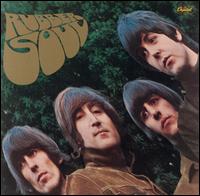 But,
not to worry. Together, these CD's contain every song the Beatles ever released commercially,
and the British versions have some distinct advantages in addition to their lengthier
running time. First, albums such as A
Hard Day's Night, Help,
and Yellow
Submarine are real albums, not soundtracks - 14 great Beatles songs sans the
schmaltzy movie music found on the U.S. versions. Second - and this cannot
be overstated - we get the albums as the Beatles intended. Almost immediately, the
Beatles began recording relatively cohesive statements rather than collections of individual
songs. Long before the vaunted "concept" of Sgt.
Pepper, they created the spare, hard-rocking With
The Beatles, the desolate, acoustic Beatles
For Sale, and, most impressively, the smart, acerbic Rubber
Soul. But,
not to worry. Together, these CD's contain every song the Beatles ever released commercially,
and the British versions have some distinct advantages in addition to their lengthier
running time. First, albums such as A
Hard Day's Night, Help,
and Yellow
Submarine are real albums, not soundtracks - 14 great Beatles songs sans the
schmaltzy movie music found on the U.S. versions. Second - and this cannot
be overstated - we get the albums as the Beatles intended. Almost immediately, the
Beatles began recording relatively cohesive statements rather than collections of individual
songs. Long before the vaunted "concept" of Sgt.
Pepper, they created the spare, hard-rocking With
The Beatles, the desolate, acoustic Beatles
For Sale, and, most impressively, the smart, acerbic Rubber
Soul.
If you take my advice, the Box
Set is an easy, affordable way to get 'em all at once, and you get the cool little
rolltop case. But, let's say you don't heed my words - or you have to watch your
pennies. What's a cost-conscious consumer to do? Well, I strongly recommend the two
double-CD sets, Beatles
1962-1966 (the "red album") and Beatles
1967-1970 (the "blue album"). Reissued precisely from earlier double-LP
sets, they are a bit abbreviated (the red album would have fit on one CD) but are
otherwise wonderful. The more recent Beatles
One CD, containing 27 (!) number one hits on one disc, is, if possible, even
better - magnificence distilled to perfection. The Singles
Collection and E.P.
Collection, on the other hand, are both pricey souvenirs, recapturing the band's
original 7-inch vinyl glory on CD - pretty cool, though....
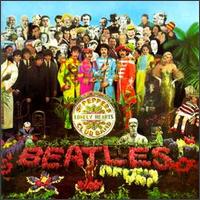 After
that, serious collectors have a lot from which to choose. The Beatles have, of course,
been the subject of thousands of bootlegs documenting (often in ridiculously minute
detail) concerts, outtakes, rehearsals, the fan club Christmas
flexi-discs, and other such ephemera. The CD era finally prompted EMI to begin
chipping away at this black market with a series of laudable releases. First came Live
At The BBC, a two-disc sampling from the Beatles' many appearances on the English
radio network. Then, the three-volume, six-disc Anthology series
dipped its toe in the treasure trove of previously unreleased goodies - plus two somewhat
dubious "new" tracks assembled by the three then-surviving Beatles from some
of John Lennon's leftover demo tapes. Released with enormous fanfare, many consumers
assumed Anthology to
be the "best" of the Beatles; it is not. But, it provides a fascinating glimpse
into the creative processes of the world's most creative band. After
that, serious collectors have a lot from which to choose. The Beatles have, of course,
been the subject of thousands of bootlegs documenting (often in ridiculously minute
detail) concerts, outtakes, rehearsals, the fan club Christmas
flexi-discs, and other such ephemera. The CD era finally prompted EMI to begin
chipping away at this black market with a series of laudable releases. First came Live
At The BBC, a two-disc sampling from the Beatles' many appearances on the English
radio network. Then, the three-volume, six-disc Anthology series
dipped its toe in the treasure trove of previously unreleased goodies - plus two somewhat
dubious "new" tracks assembled by the three then-surviving Beatles from some
of John Lennon's leftover demo tapes. Released with enormous fanfare, many consumers
assumed Anthology to
be the "best" of the Beatles; it is not. But, it provides a fascinating glimpse
into the creative processes of the world's most creative band.
Next, the Beatles gave us the "songtrack" version of Yellow
Submarine, tossing in all the actual Beatles songs used in the animate film but
tossing out producer George Martin's incidental music. Finally, Let
It Be... Naked is roughly the Beatles' final album stripped of Phil Spector's
glossy post-production - more a companion to the original rather than a replacement.
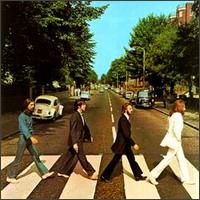 Back
in the 70's, Capitol issued Live
At The Hollywood Bowl, a record that featured thousands of screaming teenagers
more audibly than the Beatles. However, no legitimate live-in-concert Beatles album
(that one included) has ever been released on CD. This is fairly telling: since the
Beatles 1970 break-up, the former Fab Four (including Yoko Ono, Lennon's widow) have
adopted an extremely conservative strategy towards the Beatles' legacy, something I
find both admirable and frustrating. Fans can claim to have been treated fairly - that
is, not exploited, as would have been so easy. But, with so much music still unissued
and with such a limitless market, one has to wonder - why? Back
in the 70's, Capitol issued Live
At The Hollywood Bowl, a record that featured thousands of screaming teenagers
more audibly than the Beatles. However, no legitimate live-in-concert Beatles album
(that one included) has ever been released on CD. This is fairly telling: since the
Beatles 1970 break-up, the former Fab Four (including Yoko Ono, Lennon's widow) have
adopted an extremely conservative strategy towards the Beatles' legacy, something I
find both admirable and frustrating. Fans can claim to have been treated fairly - that
is, not exploited, as would have been so easy. But, with so much music still unissued
and with such a limitless market, one has to wonder - why?
Moreover, hard-core collectors gripe about the Beatles' existing CD catalog. They
have some foundation; the first four albums were issued in mono; many of the discs
run less than half an hour; and, no bonus tracks were included on the original releases.
All true, but don't let that dissuade you from experiencing the Beatles in all their
synergistic glory. Rock music rarely mattered so much - before or since.
A Quick Note. In 2004 Capitol Records begun issuing the Beatles'
albums in their American format, invalidating much of what I discuss above. I stand
by my assertion that the British configurations (originally released on Parlaphone
Records) are superior, and I would argue that only truly devoted - and well-heeled
- fans need to purchase this music yet again. But, these new versions (released as
boxed sets, The
Capitol Albums, Vol. 1 and The
Capitol Albums, Vol. 2), have been remastered, and stereo versions are included
- something that can't be said about some of the original Beatles CD reissues.
The End. In 2009, Capitol finally remastered the Beatles albums, issuing them individually, as well as in both stereo and mono boxed sets. Each of the studio albums incudes a brief QuickTime documentary, and the boxed sets include a DVD containing all of the featurettes. The two Past
Masters Vol. 1 sets, by the way, were combined into a single set. Anyway, I bought a stereo box, and it's almost perfection. Yeah! Yeah! Yeah!
|
|